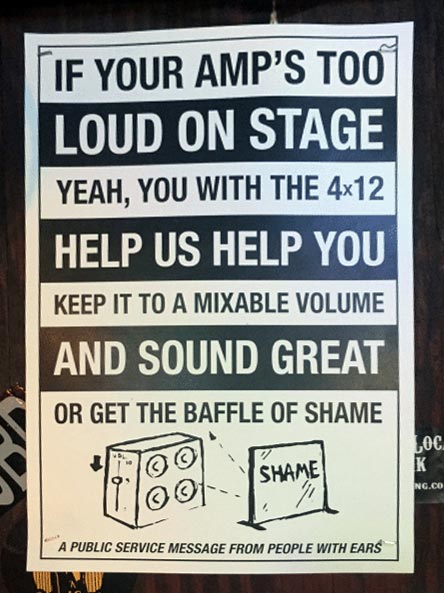Dealing with stage volume 101
Dealing with stage volume at gigs, festival performances, and even in rehearsals is something every gigging musician has to deal with on an almost nightly basis. Having a great sounding mix on stage can inspire the players individually, elevate the band into new musical territory, and wow audiences, and dealing with stage volume is a critical piece of the equation to strike the right balance so the instruments and tube amplifiers sound their best without overwhelming the other musicians, sound engineer, venue, and audience.
There are countless jokes and memes about guitarists that play too loud on stage, turn the volume up mid set, and otherwise make dealing with stage volume difficult for everyone around them. There is a better way (for guitarists in particular) to deal with stage volume and keep the killer tube amp tones that have worked so hard to dial in.
Check out this signage from a venue that’s next to the stage. The “Baffle of shame” is a real thing, but it doesn’t have to be that when when dealing with stage volume challenges at a live gig, band rehearsal, or studio sessions. We all know this scenario well: Each band member soundchecks individually to get levels for the front of house mix. Nothing is too loud, and stage volumes are at a reasonable level (so far). Once the room is full of bodies, and the band is rocking their set, the stage volume sound changes. The drummer is hitting harder, the guitarist turns up his amp, the singer asks for more vocals in the monitor, and a viscious cycle ensues where everyone is dealing with their stage volume and things are just getting louder and louder, and ultimately become impossible to mix well in the house, the monitors, and the audience gets blasted with a poor, loud mix.
This is a real phenomenon, and until now there hasn’t been a good solution to dealing with stage volume in a way that didn’t sacrifice the tone, touch, and feel of your tube amplifier.
^^ an actual sign about dealing with stage volume ^^
So, how are the pros dealing with stage volume?
Putting on a killer performance and live show is the goal for professional touring musicians. Many use in-ear monitors on stage, and need the sound to be exactly the same night to night. FluxTone Speakers were created to solve this exact situation on stage for musicians and engineers dealing with stage volume. No matter what size venue, live stage, or rehearsal space you are working with, FluxTone Speakers give guitarists the ability to push their tube amp into the sweet spot where they like it. Now they can keep the amp in that zone where it’s responsive and has great touch and dynamic, but at a stage volume that’s perfect for whatever situation they are in. The amplifier preamp, tonestack, and volume controls can be dialed in to any setting (yes, evene volume = 11), and the output volume of the speaker can be controlled independently by turning up or down the FluxTone speaker magnet.
This can also be done remotely from offstage by a front of house engineer, or other tech on the crew if needed! This gives guitarists the ability to keep using the classic/vintage tube amps they already love, and retrofit their cabinets with FluxTone speakers. Thereis no better way to keep control over the tone and tube saturation happening in the amp, AND the ability to play at any volume while having perfect stage volume for gigs in small clubs, mid-sized venues, and stadiums, as well as studio applications!
Who uses FluxTone Speakers?
Artists and Guitarists throughout the music industry know the challenge of dealing with stage volume, and many of them are now using FluxTone Speakers in their tube guitar amplifiers at their gigs and sessions to solve this stage volume issue once and for all! Artists like Brad Paisley, Justin Derrico (guitarist for Pink, The Voice), Scott Sharrard (Gregg Allman Band), and Cesar Rosas (Los Lobos), as well as many lesser-known up-and-comers are customers of ours and loving their FluxTone Speakers (not to mention their bandmates). FluxTone Speakers and Denver Amp Works amplifiers are being played by touring musicians at places like Etown Hall (Boulder), where dealing with stage volume is critical for their radio broadcast and recordings.
